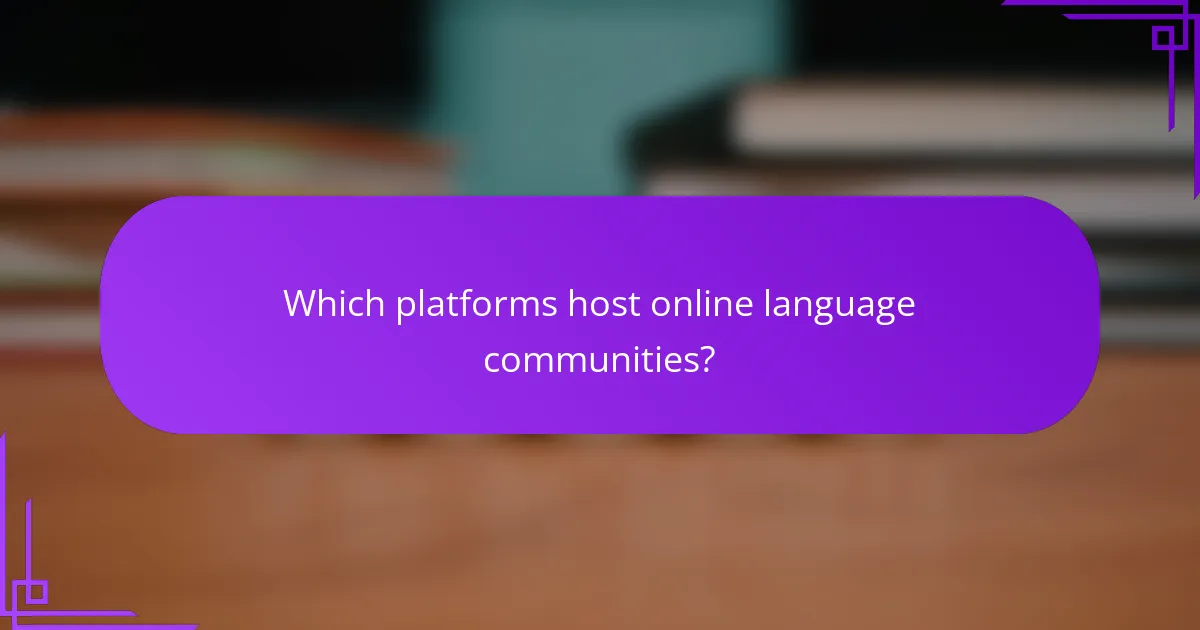Online language communities serve as vibrant hubs for individuals seeking to enhance their language skills and connect with others from diverse backgrounds. By facilitating meaningful interactions, these platforms not only promote cultural exchange but also open doors to professional networking and collaborative opportunities. Engaging in these communities allows learners and native speakers to practice, share resources, and support each other on their language journeys.

How can online language communities enhance networking opportunities?
Online language communities significantly enhance networking opportunities by connecting individuals with diverse backgrounds and language skills. These platforms facilitate interactions that can lead to collaborations, cultural exchanges, and professional growth.
Access to diverse language speakers
Joining online language communities grants access to a wide range of speakers from various linguistic backgrounds. This diversity allows members to practice their language skills with native speakers and learn about different dialects and cultural nuances.
For example, platforms like Tandem or HelloTalk enable users to find language partners worldwide, fostering real-time conversations that enhance fluency and cultural understanding.
Collaboration on language projects
Language communities often provide opportunities for collaborative projects, such as translation tasks, language learning apps, or content creation. Members can team up to share their expertise, which not only improves language skills but also builds professional networks.
Consider participating in open-source translation projects on platforms like GitHub, where you can contribute to real-world applications while connecting with fellow language enthusiasts.
Participation in cultural exchanges
Cultural exchanges within language communities allow members to share and experience each other’s traditions and customs. These exchanges can take the form of virtual events, discussion forums, or social media groups focused on specific cultures.
Engaging in these activities helps deepen understanding and appreciation of different cultures, which is essential for effective communication and networking in a globalized world.
Networking events and webinars
Many online language communities host networking events and webinars that focus on language learning, cultural discussions, or professional development. These events provide a platform for members to meet industry experts and like-minded individuals.
Participating in these events can lead to valuable connections and insights, so look for community announcements or social media posts about upcoming webinars and workshops.
Mentorship opportunities
Online language communities often feature mentorship programs where experienced speakers guide learners. These mentorships can provide personalized advice, resources, and encouragement, making the language learning process more effective.
To find a mentor, engage actively in community discussions and express your interest in receiving guidance. This proactive approach can lead to fruitful relationships that enhance both language skills and networking potential.

What are the benefits of joining online language communities?
Joining online language communities offers numerous advantages, including enhanced language skills, greater cultural understanding, and networking opportunities. These communities provide a platform for practice, exchange, and support among learners and native speakers alike.
Improved language skills
Participating in online language communities significantly boosts language proficiency. Members can engage in conversations, receive feedback, and practice speaking and writing in real-time. This interactive approach often leads to faster learning compared to traditional methods.
Utilizing resources like language exchange partners or conversation groups can help learners focus on specific areas, such as vocabulary expansion or grammar correction. Regular practice with native speakers can also improve pronunciation and fluency.
Increased cultural awareness
Online language communities expose members to diverse cultures and perspectives, enhancing cultural awareness. Engaging with individuals from different backgrounds allows learners to understand cultural nuances, traditions, and social norms associated with the language.
Members can participate in discussions about cultural events, share experiences, and even celebrate traditional holidays together. This exchange fosters empathy and a deeper appreciation for the language beyond mere vocabulary and grammar.
Building lasting friendships
Joining language communities often leads to the formation of meaningful friendships. Members connect over shared interests in language learning and cultural exchange, creating bonds that can last beyond the online environment.
Many communities host virtual events, such as game nights or cultural showcases, which encourage interaction and relationship-building. These friendships can provide emotional support and motivation throughout the language learning journey.
Career advancement opportunities
Being part of online language communities can open doors to career advancement. Language skills are highly valued in the global job market, and networking within these communities can lead to job opportunities or collaborations.
Members can share job leads, participate in professional development workshops, or even find mentors in their field. Additionally, showcasing language proficiency on a resume can significantly enhance employability in various industries, particularly in international business or diplomacy.

Which platforms host online language communities?
Various platforms host online language communities, providing spaces for learners and speakers to connect, practice, and share resources. Popular options include social media groups, forums, and dedicated apps that cater to language enthusiasts.
Facebook Groups
Facebook Groups are a popular choice for language learners, offering a wide range of communities focused on specific languages or learning goals. Users can join groups that match their interests, participate in discussions, share resources, and ask questions.
When joining Facebook Groups, look for active communities with regular posts and engagement. Be mindful of group rules and etiquette to foster a positive environment. Examples include groups like “Spanish Language Learners” or “French Conversation Practice.”
Reddit Language Subreddits
Reddit hosts numerous language subreddits, where users can engage in discussions, seek advice, and share learning materials. Each subreddit typically focuses on a specific language or aspect of language learning, such as r/languagelearning or r/Spanish.
To make the most of Reddit language subreddits, participate actively by asking questions and sharing your experiences. Keep an eye out for weekly threads that encourage practice and community interaction, which can enhance your learning experience.
Discord Language Servers
Discord language servers provide real-time communication through text and voice channels, making them ideal for interactive learning. Many servers focus on specific languages, offering opportunities for conversation practice and cultural exchange.
Joining a Discord server often requires an invitation link, which can be found on language learning forums or social media. Look for servers with a friendly atmosphere and active members to maximize your practice opportunities. Examples include servers dedicated to Japanese or German language learners.
Language Exchange Apps
Language exchange apps connect users with native speakers for mutual learning, allowing individuals to practice speaking and writing in their target languages. Popular apps include Tandem, HelloTalk, and Speaky, which facilitate one-on-one conversations.
When using language exchange apps, set clear goals for your practice sessions, such as focusing on specific vocabulary or conversation topics. Be respectful and patient with your language partner, as both of you are learning. Aim for regular exchanges to build confidence and fluency over time.

What criteria should you consider when choosing a language community?
When selecting a language community, consider factors such as community size, activity level, language focus, and available resources. These elements significantly impact your networking opportunities and overall experience in learning a new language.
Community size and activity level
The size of a language community can influence the variety of networking opportunities available. Larger communities often provide more interaction options, but they may also lead to a less personal experience. Aim for a community that balances size with active participation, ensuring that members regularly engage in discussions and activities.
Check for community activity by observing the frequency of posts, events, and member interactions. A vibrant community will have daily or weekly activities, while a dormant one may have infrequent updates. Look for communities that host regular language exchange sessions or discussion forums to maximize your engagement.
Language focus and diversity
Consider the specific languages and dialects that a community emphasizes. Some communities may focus on widely spoken languages like Spanish or Mandarin, while others might cater to less common languages. A diverse community can provide exposure to various cultures and dialects, enriching your learning experience.
Evaluate whether the community supports multiple proficiency levels. A good mix of beginners, intermediate, and advanced speakers can foster a supportive environment where members help each other grow. Look for communities that encourage peer-to-peer learning and offer resources for different skill levels.
Available resources and tools
Assess the resources and tools that a language community offers to its members. This can include language learning materials, conversation practice tools, and access to native speakers. Communities that provide structured resources, such as grammar guides or vocabulary lists, can enhance your learning process.
Additionally, consider whether the community uses technology to facilitate learning. Tools like chat applications, video conferencing, and language learning apps can significantly improve your interaction and practice opportunities. Look for communities that leverage these technologies to create a more interactive and engaging environment.

How do online language communities support language learning?
Online language communities provide essential support for language learning through interactive platforms that facilitate communication and practice. These communities connect learners with native speakers and fellow learners, creating an environment conducive to language acquisition.
Peer-to-peer practice
Peer-to-peer practice is a fundamental aspect of online language communities, allowing learners to engage directly with one another. This interaction can take place through text, voice, or video chats, enabling users to practice speaking and writing in a real-world context.
To maximize the benefits of peer-to-peer practice, learners should seek partners with similar language goals and proficiency levels. Setting regular practice sessions, perhaps weekly or bi-weekly, can help establish a routine and ensure consistent progress.
Common pitfalls include relying solely on one partner or not preparing for sessions. To avoid these issues, consider rotating partners and preparing specific topics or questions in advance to keep conversations engaging and productive.


